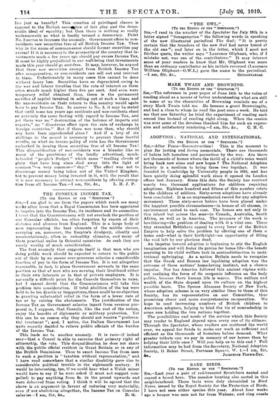THE CONSUL'S INCOME TAX.
[To THE EDITOR OF THE "SPECTATOR."] Si,—I am glad to see from the papers which reach me many weeks after issue that a Royal Commission has been appointed to inquire into the Income Tax, its incidence and its anomalies. I trust that the Commissioners will not overlook the position of our Consular officials, too often forgotten by reason of their distance and absence from England. This is a large body of men representing the best elements of the middle classes, carrying on, moreover, the Empire's drudgery, silently and unostentatiously, often in unhealthy climates, and many of them practical exiles in Oriental countries. As such they are surely worthy of much consideration.
The first anomaly that suggests itself is that men who are doing public work should be expected to return to the public out of their by no means over-generous salaries a considerable fraction of pay in the form of Income Tax. It is not altogether reasonable, in fact, to place Government servants in the same position as that of men who are earning their livelihood either in their own interests or in that of private employers. It is naturally a difficult point for the Consuls themselves to raise, but I cannot doubt that the Commissioners will take this problem into consideration. If total abolition of the tax were held to be too drastic or inopportune, there could be no objection to granting substantial relief in the form of a lower rate of tax or by raising the abatements. The justification of the Income Tax on Government salaries (apart from revenue pur- poses) is, I suppose, that Consuls, like the rest of the nation, enjoy the benefits of diplomatic or military protection. Yet this can be no reason why they should not receive "preferen- tial treatment "; and, I notice, the Italian Government has quite recently decided to relieve public officials of the burden of the Income Tax.
This leads me to another anomaly. It is rare—if indeed ever—that a Consul is able to exercise that primary right of citizenship, the vote. This disqualification he does not share with the public official resident in Great Britain or in any of the British Dominions. Thus to exact Income Tax from men In such a position is "taxation without representation," and I have read somewhere that a similar disability gave rise to considerable political trouble in the eighteenth century. It would be interesting, too, if we could hear what a Welsh miner would have to say if he were asked (I must not suggest com- pelled) to pay anything from 2s. in the pound upwards and were debarred from voting. I think it will be agreed that the above is an argument in favour id reducing very materially, even if not abolishing altogether, the Income Tax on Consular


































 Previous page
Previous page